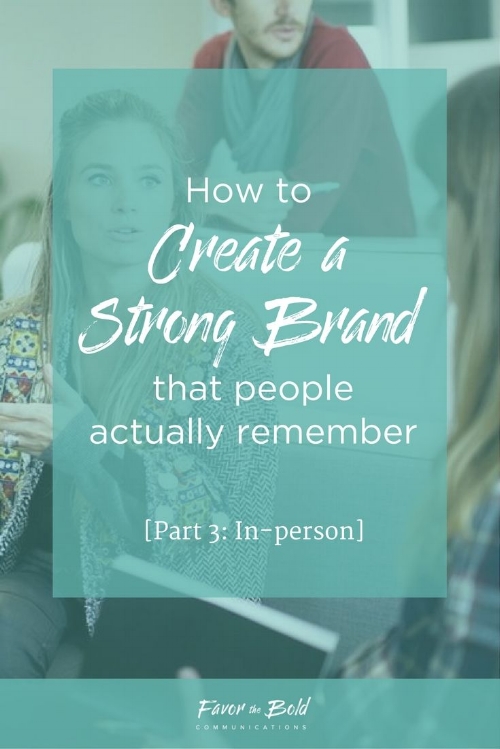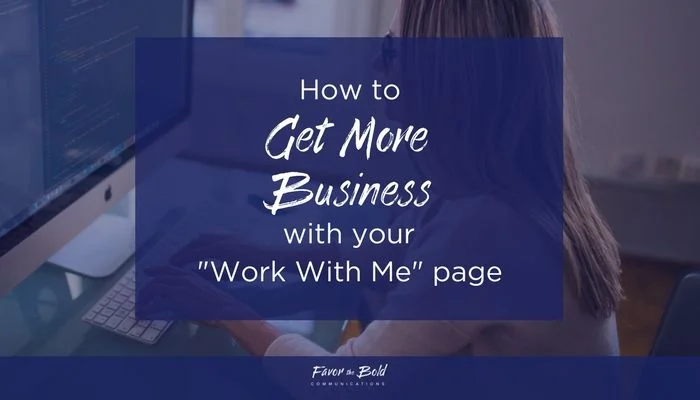I want to tell you an embarrassing story.
I mean, I don’t actually want to (it's super embarrassing), but I need to because it perfectly illustrates why consistent branding-- on and offline-- is so important.
It was right after I launched my site. I had these fancy (and let’s face it, unrealistically flattering) head shots; some bold, cheeky web copy (that I had spent days painstakingly writing and editing); and a shitload of unwarranted confidence that I was going to nail this business thing.
I got a client. And then another. And then another. I was smashing it.
Until...
I had a consultation call over Skype with a potential copywriting client that I really wanted to work with. She had found me through my blog and needed a full rebrand and web copy. It seemed like the perfect fit. Even before speaking with her, in my mind, that contract was mine.
And then, about 15 minutes into the call, she said something that I still haven’t gotten over:
“It’s weird, in person, you’re nothing like how you are on your website.”
Ouch.
But she was right. On my website, I was all bright colors, big personality and confidence for days. But in person? I had turned up to our video call looking like I had just come back from a run, with similar levels of low energy. I wanted that contract so bad, I was acting like an ass-kissing, people-pleasing amateur instead of the confident communication expert I am.
And if it isn’t already clear, I didn’t get the contract.
But what I did get is a valuable lesson on personal branding. Namely, how important it is to represent your brand well-- even offline. So let’s break down what I learned-- and how you can avoid making the same mistakes I did.
1. Your pitch
Seeing as I get paid to help people articulate what they do, you’d think I’d have no issue doing it myself. But that wasn’t always the case.
When I first started out, I spent hours writing my one sentence pitch explaining what I do, who I do it for and why they need it. I wrote about fifty versions of that mofo until it perfectly captured the heart and soul of my business.
The problem? I had never practiced it out loud.
Writing your business manifesto isn't the same as crafting an elevator pitch you can actually use in conversation.
I had the written manifesto, but when it came to explaining it to a potential client, it sounded cheesy and robotic.
Don’t make the same mistake I did: practice your elevator pitch, out loud, to another person before trying to use it on a potential client. Because believe me, stuttering through an aspirational mission statement in a sales meeting is not going to impress anyone.
2. Your personal style
Yep, I’m doing it again: talking about how looks matter.
I know. I know. Every feminist bone in my body (i.e., all of them) hates the implications of that statement, but please just hear me out.
When I talk about your personal style, I am not saying you have to look a certain way or have a certain level of attractiveness. Oh hell no. What I mean is:
Your style should be aligned with your brand.
That’s it. I promise.
What that means is that if your business bills itself as a creative innovator with an eye for design, and then you walk into a meeting wearing a pantsuit and a light pink button-down shirt, you might confuse people.
Take me for example. My whole philosophy-- in business and in life-- is never be neutral. Be unapologetic about who you are. Don't be beige. Kick boring in the balls.
So when I show up to a meeting with a potential client in a gray crew-neck sweater and jeans with a messy ponytail and minimal make-up, I shouldn’t be surprised when they tell me, “You look nothing like your profile picture.” ← [True story and it still hurts.]
If your brand is creative, look creative. If your brand is bold, look bold. If your brand is corporate, look corporate. Again, it doesn’t matter what your style is-- what matters is that it’s on-brand.
3. Your “voice”
Don’t worry, I’m not talking about the way your speaking voice sounds. If I was, I’d be screwed because my voice is the woooorst.
No, I’m talking about your brand voice.
As a rule, when it comes to personal branding, what they see online should be what they get offline.
For example, if your brand voice on your blog and social media is sweet and loving, you shouldn’t be dropping F-bombs and giving hardcore tough love in a consultation call.
Or in my case, I can’t front like I’m some some ballsy communications messiah on my website and then show up to a consultation meeting acting like an abandoned puppy that just wants to be loved-- which is exactly what I did with that potential client who called me out on it.
This is why I always tell my clients not to shy away from showing their true personality when building a personal brand. Your brand’s personality will attract certain types of people-- which is a good thing. But if your brand’s personality doesn’t align with your own personality, you run the risk of them loving you online, and then thinking, “Who the hell is THIS person?” once they meet you.
Which, needless to say, probably won't get you the contract.
4. Your demeanor
I saved this one for last, because it’s a tough one, but it’s also so important.
The truth is, when a potential client wants a consultation, what they really want is to answer the all-important question: “Can she help me?” That’s it. The client has a problem and they want to know if you can solve it.
And yes, they are absolutely looking at factors like your process, your experience and your credentials-- but they’re also judging your demeanor. Your presence. Your personality.
Have I freaked you out yet?
It’s a hard pill to swallow, but it’s true:
How you conduct yourself in person will decide whether or not you get the contract.
A potential client will notice whether you’re confident or stressed out, cooperative or defensive, relatable or aloof-- and that will affect their decision to work with you. No credentials or portfolio examples will balance out an incompatible personality.
Believe me, I learned that the hard way. I went into that fateful consultation call over-confident and unprepared, and then quickly became a sycophantic ass-kisser once I realized that it wasn’t going well.
And let’s be honest, that's NOT a good look.
Listen, I get it: it’s hard to be confident, especially when you’re just starting out and especially when you really need that contract. But, remember, clients expect you to be the expert. They expect you to have the answers. They expect you to be able to solve their problems.
And if your own insecurities make them question that? You’re not going to get that contract.
So, as with most situations in life, preparation is key. Going into meetings with potential clients feeling relaxed, prepared and confident (but not over-confident) is essential. Being personable, relatable and friendly will make them want to work with you. Really listening to their problems and helping them understand how you can solve them will get you hired.
Because the key to making a living doing the work you love is working with clients you love-- and who love you back.
So show them who you really are and give them the best part of your personality.
Because when you do? You'll attract those dream clients and land those ideal contracts-- and fall in love with your work.







![How to boost your brand offline-- and get more business [Part 3]](https://images.squarespace-cdn.com/content/v1/5671d7a82399a31f114f4c55/1477565172008-2K7456WNHWYM99T12HTV/How+to+boost+your+brand+offline--+and+get+more+business.jpg)
![How to stand out online-- and create a brand people remember [Part 2]](https://images.squarespace-cdn.com/content/v1/5671d7a82399a31f114f4c55/1476881625926-DUD66M9W25YXC8JY7OCB/How+to+make+your+brand+stand+out+online.jpg)
![How to create a strong brand that people actually remember [Part I]](https://images.squarespace-cdn.com/content/v1/5671d7a82399a31f114f4c55/1476376068740-S3E3B40OGXGXENSW6WS0/How+to+create+a+strong+brand+part+1.jpg)


